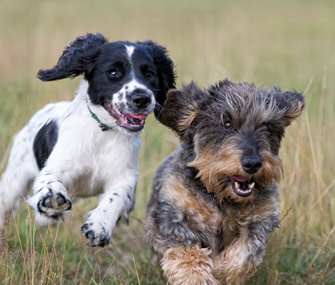How to Help Keep Your Senior Dog’s Mind and Body Healthy
Published on September 30, 2014
Skip To

Start by talking with your veterinarian about your senior dog’s health — and be sure to mention any behaviors that are concerning you. Once you’ve gotten a medical OK, there are a few simple steps you can take to help keep your older dog feeling and acting as young as possible.
Eat Right and Stay Fit
Certain ingredients and supplements in a dog’s diet may promote brain health. Talk to your veterinarian about how brain-supporting supplements and prescription therapeutic diets may improve your canine’s brain health. Exercise is an important part of your dog’s physical and mental well-being; it releases healthy endorphins and reduces stress hormones, like cortisol. Physical activity also engages your dog’s mind by giving him a chance to explore and experience life outside the familiar and mundane. There are numerous ways to improve your dog’s physical — and mental — workout. Many dogs remain active well into their senior years and enjoy games of fetch or sports like agility or flyball (although you should check with your veterinarian before starting any exercise program with your pooch).
Dogs with limited mobility still need to get out of the house in order to keep their brains active, even if they can’t go far. Slow walks during temperate times of day allow your senior dog to explore and discover new sights and smells. Perhaps your senior pooch can also improve his balance and challenge his brain by using stability balls and hydrotherapy. And even a dog who is severely physically limited can join the family on a walk by riding in a stroller or wagon — he will still get to enjoy the stimulation of the world around him.
Learn Something New
If your dog has a behavior issue, now is the time to address it. Once you have determined that the behavior is not related to a health problem, you can talk with your veterinarian, who may refer you to a veterinary behaviorist or trainer who specializes in positive reinforcement training. Sometimes all that is needed to end bad behavior is for your dog to learn a different response to replace the bad behavior. In some cases, though, medication — in combination with training — can be helpful in addressing a deeply ingrained behavior.Training isn’t just a solution for bad behavior — even well-behaved dogs can benefit from training. Learning and practicing new tricks exercises and challenges your dog’s mind. I recommend clicker training, which is reward based, relies on positive reinforcement and exercises your dog’s mind as he learns.
Experience the World
Even older dogs benefit from going new places and experiencing new things. Dogs that are friendly with people and other animals can benefit from social interactions like play dates with doggie friends, trips to the neighborhood coffee bar, or outings to a dog-friendly beach, park or pet store.Dogs with more limited social needs can participate in activities such as exploring new smells. Pick up a game scent, such as deer or skunk, from an outdoors store and place it on a toy to get your dog interested in the smell and object, or play a basic scenting game with your dog.
You can also stimulate your dog’s brain by making playtime a challenging experience. Place a small portion of your pet’s meals in food puzzles that can be rotated on a regular basis, or scatter kibble in the yard for your dog to find using his nose. Rotate toys frequently to help prevent boredom. Play new games with your pooch to keep him busy and encourage interaction.
Incorporating even a few of these practices can help create a framework your dog can use to cope with changes related to aging. And it might even make him act — and feel — a little younger, too.





